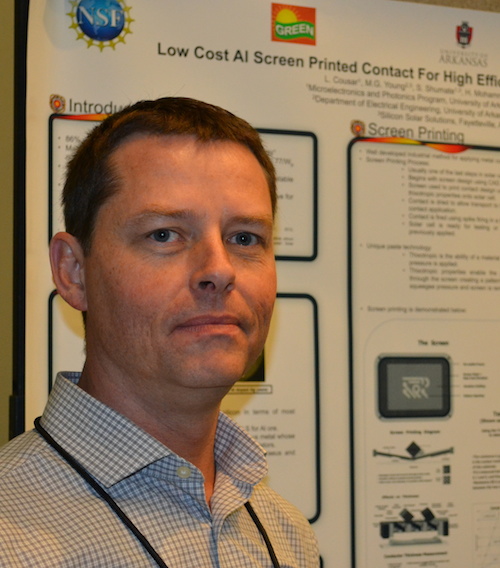Nano Student Researchers Compete in Scientist Idol at EPSCoR Conference
Can you explain how aluminum can be used as a low-cost solution for electrodes in solar cells? How does a plasmonic structure enhance absorption in solar cells?
Students from the Institute of Nanoscience and Engineering at the University of Arkansas competed in the Science Idol contest last week at the National EPSCoR Conference. Larry Cousar, Corey Thompson and Sayan Seal demonstrated their ability to communicate effectively their research in under three minutes.
In addition to a traditional poster session, the students received sessions from Ninja Communications, an organization that promotes effective science communication. Successful authors, including Joe Schreiber and Chris Mooney, taught students how to captivate an audience through the use of a Message Triangle, part of the proprietary NinjaComs' Communications Planning Worksheet. The goal of the competition was for the students to work together to create a three-minute speech on how the research in Arkansas was stimulating the economy.
All of the students who attended the event are involved with one of the EPSCoR funded programs — the Arkansas Green Renewable Energy-Efficient Nanoplasmonic Solar Cells Center, or GREEN, or the Vertically-Integrated Center for Transformative Energy Research (VICTER). Cousar explained that the "opportunity to do my research and present it at the conference came from the support and encouragement of Dr. Naseem, an electrical engineering professor involved in GREEN."
Thompson said that the concept of Science Idol was solid. One point in his speech for Science Idol was how in Arkansas "scientists are finding ways to leverage EPSCoR funding to connect the dots between basic research and economic impact." In his speech, he highlighted educational initiatives such as the "VICTER PowerBox that provides K-12 teachers with resources to teach about energy and the GREEN Mobile, a converted Winnebago that travels the state as a mobile solar energy education lab." He cited many other Arkansas achievements that have begun changing the perception of science, technology, engineering and mathematics (STEM) careers in the state.
Cousar, a new graduate student in the interdisciplinary microelectronics-photonics program, commented that the experience was helpful in developing his communication skills.
Contacts
Tim Morgan, Graduate Student
Institute for Nanoscience and Engineering
501-222-7340, tamorga@uark.edu
